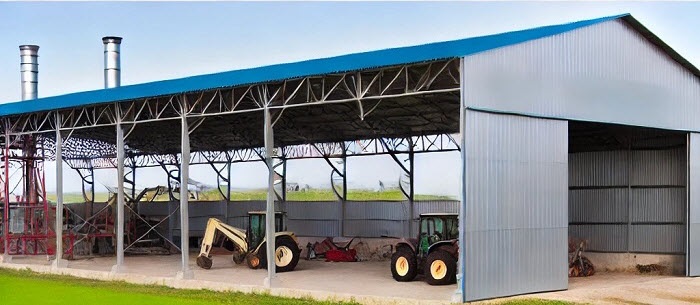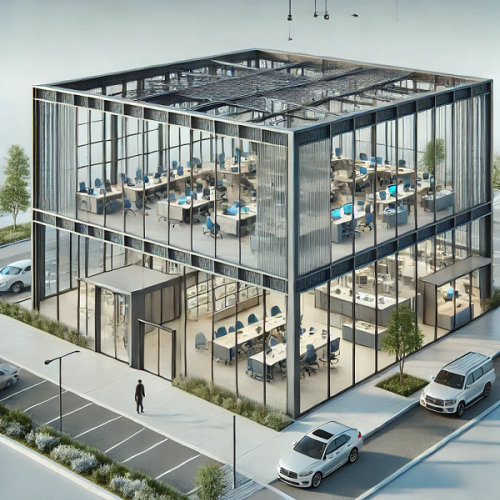How Different Types of Pre-Engineered Buildings Are Shaping South Sudan Cities?

What Are Pre-Engineered Buildings (PEBs)?
Pre-engineered buildings (PEBs) are structures that are designed and fabricated in a factory, then assembled on-site. This method allows for faster construction, lower costs, and flexible design options. PEBs are commonly used for industrial, commercial, and residential applications, making them ideal for growing cities.
Now, let’s dive into the specific types of PEBs and their impact on South Sudan’s cities.
PEB Warehouse in South Sudan Cities
Warehousing is critical to any developing economy, and South Sudan is no exception. PEB warehouses are becoming an essential part of urban and industrial growth, providing safe and efficient storage solutions for goods, raw materials, and finished products.
- Juba: As the capital and commercial hub, Juba is witnessing a rise in demand for PEB warehouses to support businesses in trade and logistics. These warehouses help manage goods more efficiently in a city where imports and exports are increasing rapidly.
- Wau: Wau, being a key agricultural center, benefits from PEB warehouses that store crops and livestock feed, reducing spoilage and losses during peak seasons.
- Nimule: Located at the border with Uganda, Nimule is a vital trade route. PEB warehouses here are essential for storing goods in transit, boosting the city’s role as a logistics hub.
PEB Factories in South Sudan
PEB factories are playing a crucial role in shaping the industrial landscape of South Sudan. These factories are used to manufacture products and process resources, supporting the country’s emerging industries.
- Malakal: With its proximity to the oil-rich regions of South Sudan, Malakal is leveraging PEB factories to support the oil industry, providing manufacturing and storage space for oil-related equipment.
- Bentiu: As the center of the country’s oil production, Bentiu is increasingly using PEB factories for oil extraction and refining, streamlining operations in the oil sector.
- Bor: Located near the Nile River, Bor benefits from PEB factories for manufacturing and processing, supporting local industries and employment.

PEB Sheds for Agriculture and Industry
PEB sheds are versatile structures that can be used for both agricultural and industrial purposes. They provide shelter for equipment, machinery, and raw materials, making them essential for both farming and manufacturing activities.
- Rumbek: Agriculture is a key part of Rumbek’s economy, and PEB sheds are being utilized for storing farming equipment and harvested crops. These sheds help protect resources from the elements and enhance productivity.
- Aweil: Aweil, near the Sudanese border, uses PEB sheds to store agricultural products, machinery, and vehicles, boosting the efficiency of local farmers and traders.
PEB Godown in South Sudan Cities
A godown is a storage building designed to handle large quantities of goods, often used for wholesale trading and logistics. PEB godown provide safe, spacious, and well-ventilated storage for a variety of industries.
- Yei: Yei, a growing commercial center, benefits from PEB godowns that store goods for businesses and traders who operate along the Uganda-South Sudan trade route. These godowns ensure that goods are stored securely before they are distributed across the country.
- Torit: In Torit, PEB godowns support the region’s emerging food and beverage industry by storing raw materials and finished products. The quick setup of these godowns allows businesses to scale their operations rapidly.

PEB Offices: Creating Modern Workspaces
PEB offices offer modern, functional, and flexible workspaces for businesses across various sectors. These structures can be customized to meet the specific needs of companies and are often quicker and more affordable to build than traditional office buildings.
- Juba: As the commercial and administrative heart of South Sudan, Juba is seeing a surge in the demand for PEB office spaces. From corporate headquarters to small business offices, these buildings are providing much-needed workspace in a growing city.
- Nimule: Nimule, a vital trade and transport hub, is also adopting PEB offices to support businesses involved in cross-border trade and logistics. These offices are an efficient solution for companies that need functional spaces near the border.
PEB Refineries in South Sudan
The oil and gas sector is critical to South Sudan’s economy, and PEB refineries are vital for supporting the extraction and processing of oil. These refineries are designed to house heavy machinery and equipment, providing the necessary infrastructure for oil production.
- Malakal: With its proximity to oil fields, Malakal is home to several PEB refineries that process crude oil. These structures are crucial for the efficient and safe operation of the oil industry, ensuring that oil is refined and stored properly.
- Bentiu: As the epicenter of South Sudan’s oil production, Bentiu’s use of PEB refineries is helping the country maximize its oil output. These refineries are built to handle the harsh conditions of oil extraction, offering durability and efficiency.
How Pre-Engineered Buildings Are Shaping the Future of South Sudan Cities?
Pre-engineered buildings are not only changing the industrial landscape but also transforming how cities in South Sudan are expanding and modernizing. PEB buildings offer flexibility, speed of construction, and cost savings, which are critical factors in a developing country.Boosting Industrial Growth
PEBs are supporting industrial growth by providing the necessary infrastructure for manufacturing, processing, and warehousing. This is helping cities like Juba, Malakal, and Bentiu attract more investment in sectors such as oil, agriculture, and trade.Enhancing Trade and Logistics
Cities like Nimule and Yei are benefiting from PEB warehouses, godowns, and offices, which are enhancing their roles as trade and logistics hubs. These cities are becoming vital points for cross-border trade, improving the overall economy of the country.Supporting Agriculture
In cities like Wau, Rumbek, and Aweil, PEB sheds and warehouses are helping farmers and agricultural businesses store equipment and crops more efficiently. This support for the agricultural sector is essential for food security and rural development.Creating Employment Opportunities
The rapid construction of PEBs across South Sudan’s cities is creating employment opportunities in construction, manufacturing, and related sectors. This growth is helping to alleviate unemployment and boost local economies.Conclusion
Pre-engineered buildings are proving to be a cornerstone of South Sudan’s urban and industrial development. From warehouses and factories to offices and refineries, these structures are enabling the rapid expansion of cities like Juba, Malakal, Bentiu, and Wau. By offering faster construction times, lower costs, and flexibility in design, PEBs are shaping the future of South Sudan, supporting its growth as an industrial and commercial powerhouse.FAQs Pre-Engineered Buildings
1. What are the key benefits of pre-engineered buildings in South Sudan?
Pre-engineered buildings offer quick construction, cost savings, and flexibility in design, making them ideal for various industrial and commercial applications in South Sudan.
2. How are PEB warehouses benefiting South Sudan's cities?
PEB warehouses provide efficient storage solutions for goods and raw materials, supporting industries like agriculture, trade, and oil production.
3. Why are PEB factories important for South Sudan's economy?
PEB factories offer the infrastructure needed for manufacturing and processing, helping to grow industries and create jobs in cities like Juba, Malakal, and Bentiu.
4. Can PEB offices be customized to meet business needs?
Yes, PEB offices are highly customizable, offering functional and modern workspaces that can be tailored to the needs of any business.
5. What role do PEB refineries play in South Sudan’s oil industry?
PEB refineries provide the necessary infrastructure for oil extraction and processing, supporting the country’s vital oil and gas sector.
- Ready-to-Assemble Steel Structure to Sudan for the United Nations – Case Study
- Which Steel Cable Tray Type is Best? A Look at Perforated, Ladder, Wire Mesh & Flexible Trays
- The Impact of Temperature Variations on Cold Storage Warehouses in Different Cities of Uganda
- The Impact of Factory Shed Layout on Workflow Efficiency
- Uganda’s Rising Demand for Cold Storage Builders in the Logistics Industry
